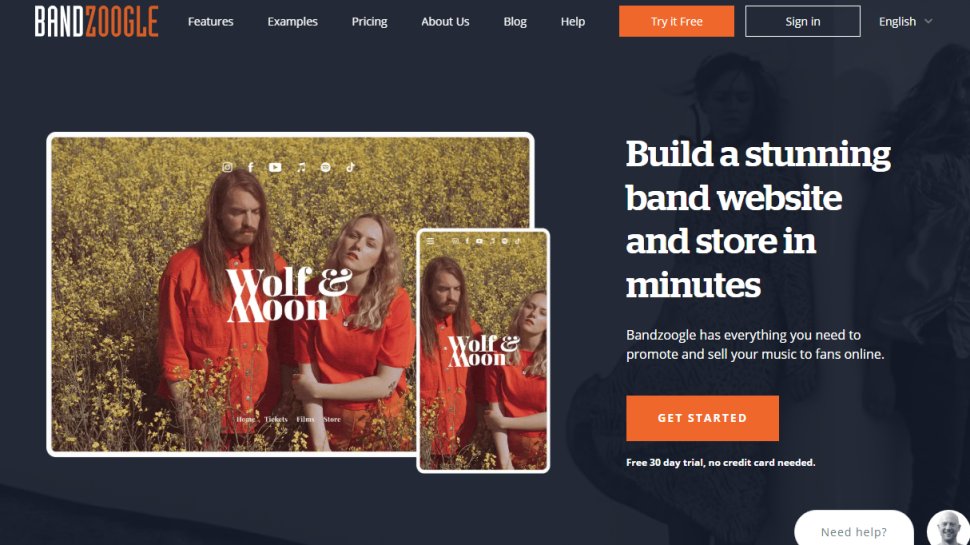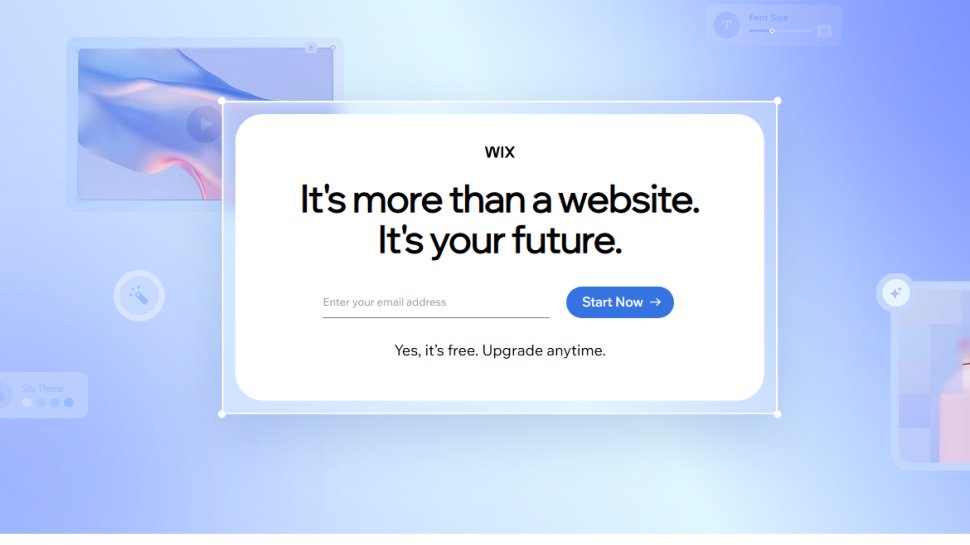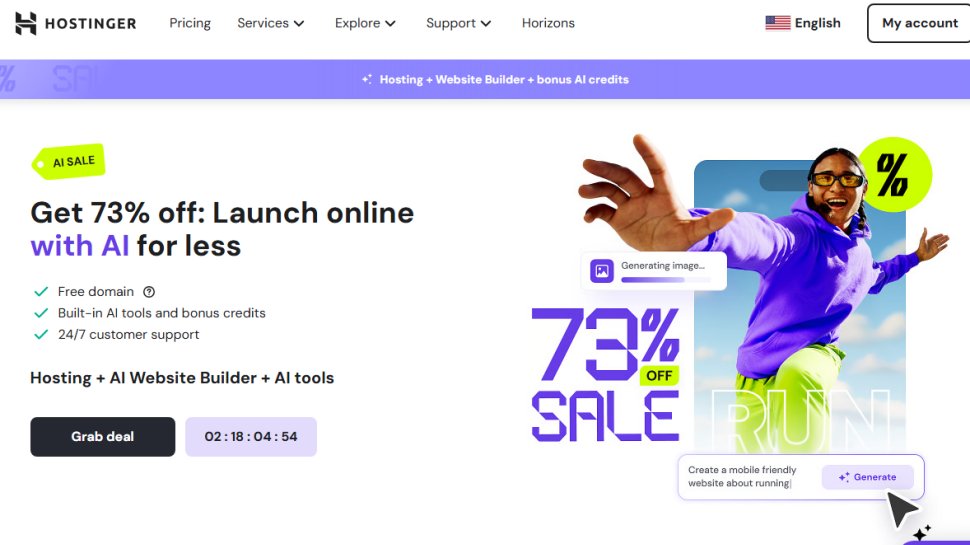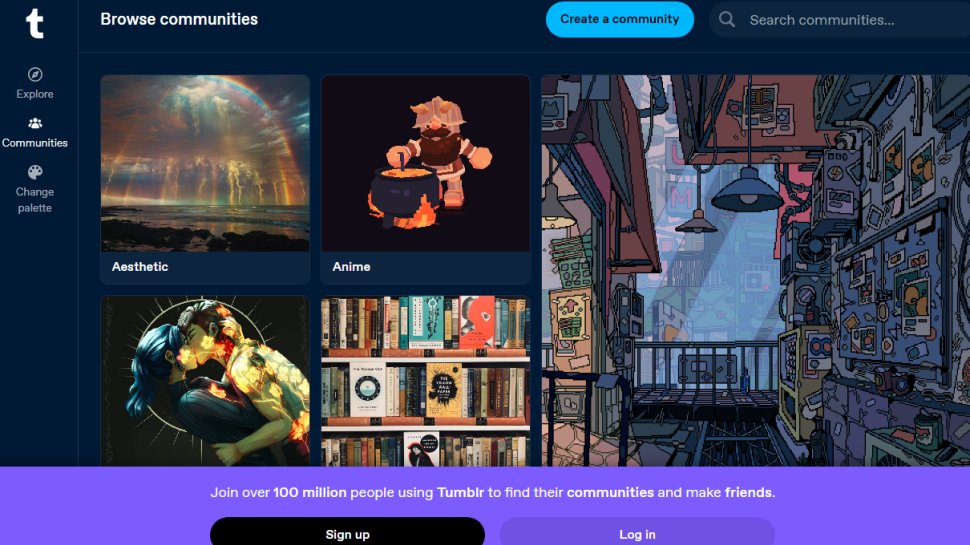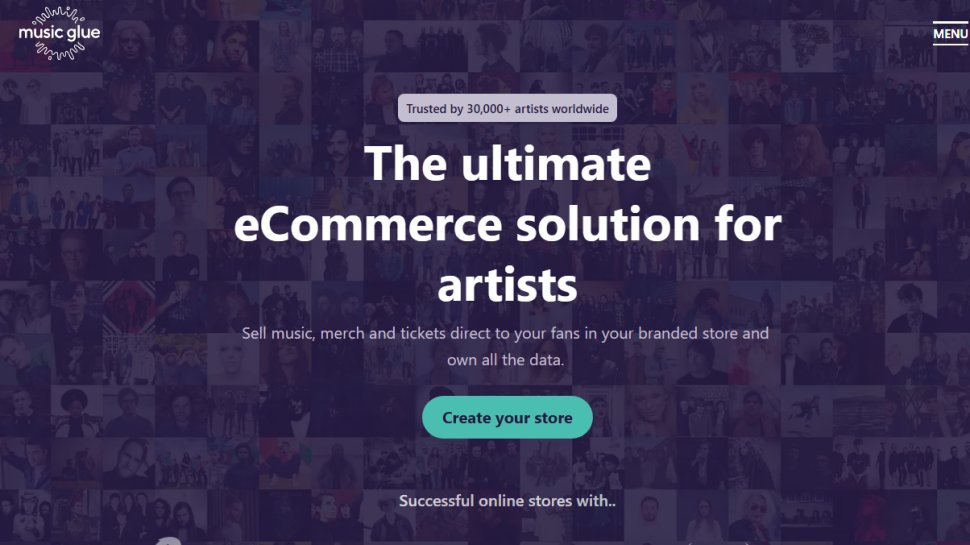Best website builder for musicians of 2025
Better promote your music

Sign up for breaking news, reviews, opinion, top tech deals, and more.
You are now subscribed
Your newsletter sign-up was successful
Reader offer: Get up to 75% off on hosting with Hostinger
Get top-notch performance, extensive features, and unbeatable value for money. With Hostinger you can enjoy free domain, SSL, backups, and more. Upgrade for professional extras like NVMe storage, CDN, and WordPress caching.
Preferred partner (What does this mean?)
We list the best website builders for musicians, to make it simple and easy to share your music, connect with your audience and promote your tickets and merchandise without needing to learn code.
Most website builders can help you get your music online, quickly and easily – but if you're looking for something to show off your talents as a musician then you need a more specific set of features.
Primarily, a way of uploading and sharing your tunes in a simple and secure way, even if it's just snippets of songs rather than whole tracks.
If you're a musician for hire then it can be useful to have some kind of booking system in place, or at least a contact form. On top of that, there are all the extras you might be interested in, like support for your own domain name or gallery pages to show just how many people came to your last gig.
We've compared these website builders for musicians across various points, including the ease of setup, interface, audio streaming performance, plugins, social media integration, and pricing, among other things.
Scroll down to read our comprehensive shortlist of the best website builder for musicians to create a presence online and showcase your music.
We've also reviewed the best laptops for DJ and music production.
Top 3 website builder services overall
Why you can trust TechRadar
Once you get a taste for building your own site you may decide you're looking for more of a website-building all-rounder. Our top three website builders offer top-class easy to use services that could transform your online presence, giving you the freedom to create any type of website you need.
1. Wix - a top-notch website builder that's great value
Wix is top dog when it comes to free website builders, but it also offers some powerful paid plans. These start from as little as $16 per month for the Light plan (over three years) which removes the adverts from your site, as well as giving you 2GB of storage space, a free domain and free SSL certificate.
2. Gator is a great website builder service
Gator Site Builder from HostGator has a superbly cheap Starter package which comes with free hosting and a domain name included, plus a free SSL certificate. You get constantly available customer support, too, and the benefit of website analytics to boot: all with 55% off meaning you pay just $3.46 per month.
3. Hostinger - high-quality site builder with web hosting
Hostinger offers a website builder that is very easy-to-use and ideal for novices, allowing anyone to get their site up swiftly. You’ll pay very little for the privilege too and it includes web hosting services plus more.
The best website builders for musicians of 2025 in full:
Best website builders for musicians overall
Reasons to buy
Reasons to avoid
You won't find too many website builder services aimed specifically at musicians, but Bandzoogle gleefully jumps in to provide a bespoke service specifically for bands and artists. While it lacks some of the polish of the big names, because it focuses on the musician niche in particular, it has everything you should need.
That includes, of course, the ability to upload your own tracks and let visitors stream them from your website. You can get tracks organized into entire albums if you really want to go to town, or just share (or even sell) single tracks. And then, as well as that, you've got simple ways to post gig dates, blog updates, and so on.
Whether you need to build a contact form or a video diary, Bandzoogle makes it easy, no coding required – you can really make a site that's as simple or as complex as you like, and the end result is something that looks like you hired a specialist.
You've got over 100 themes to choose from (there is even one for crowdfunding), they're all straightforward to edit and tweak, and connecting to SoundCloud, Bandcamp or your other social accounts takes only a few clicks.
You can even sell fan subscription, merchandise and tickets through your account, with mailing lists and promotion tools to help you get the word out,
This all makes, in our opinion, Bandzoogle the best overall website builder for musicians.
Read our Bandzoogle review.
Best website builders for musicians for plugins
Reasons to buy
Reasons to avoid
Check out any list of website builders for any purpose and Wix is likely to feature on it, but not only does this service earn that high reputation, it also has some useful tools for musicians – not least the ability to upload your own tracks so visitors to your website can listen to them without any extra software or browser extensions.
Platforms that you're probably already using, like Bandsintown and Songkick, can plug directly into your Wix site: you can set up integrations like these in just a few clicks. What's more, you can add on an e-commerce portal to your site, for the purposes of shifting albums, T-shirts, or whatever else you need to sell.
Wix has a very solid selection of templates, with more than 500 to choose from, and if you delve into the music section, you'll see there are options for solo artists, bands, DJs, producers, or anyone else connected to the industry. Have a click around these templates to see the kind of sites it's possible to create.
After that you've got all the features Wix has become known for: a site editor that's a breeze to use whether or not you know what CSS stands for, custom domain name support, easy blogging and simple social media integration, and a free tier that lets you work out whether Wix is for you before you part with any cash.
Overall, Wix is a great website builder, especially for musicians.
Read our full Wix review.
Visit our Wix promo codes page for the latest deals and discounts.
Best website builders for musicians for beginners
3. Hostinger
Our expert review:
Reasons to buy
Reasons to avoid
Hostinger is a smart choice for musicians aiming to create a strong online presence, particularly those working on a tight budget. With its pocket-friendly yet comprehensive package, Hostinger provides a free domain, up to 100 email addresses, core e-commerce features, and marketing integrations - everything you need to showcase your musical mastery effectively.
The platform's robust SEO tools are a musician's best friend, empowering top-notch Google rankings and effective online marketing strategies. Its intuitive and insightful interface seamlessly integrates with email marketing services and various other marketing platforms, offering an all-in-one solution able to cater to a whole variety of website needs. What's more, Hostinger's platform allows seamless integration of social media icons into your website, so you can display your social media profiles, boosting both your visibility and engagement with your audience.
However, Hostinger's straightforward approach doesn't skimp on functionality. Its intuitive, drag-and-drop editor streamlines site customization, offering contact forms and subscription options to foster fan interaction and professional connections. Musicians can showcase their work vividly, featuring galleries, audio snippets, and integrated videos.
Hostinger's AI tools, including the AI heatmap for predicting visitor behavior and an AI logo maker, can inject both style and practicality into your site. With wide customization options, even complete novices can craft a clean and professional site, ensuring an attractive and engaging digital platform for showcasing musical talents.
Although Hostinger isn’t created with musicians in mind and doesn’t offer musician-specific tools, its top-notch features hold undeniable value. While adding external apps might demand a bit more effort, the platform’s affordability, responsive design, and solid live chat support overshadow these minor limitations, ensuring a superb choice for musicians seeking an all-around website builder.
All in all, Hostinger's site builder has everything to empower musicians to create an online presence as stunning as their music. Despite minor drawbacks, its fine features and budget-friendly plans make it an exceptional choice for those looking for an easy-to-use yet efficient site builder.
Read our full Hostinger website builder review.
Get the best deal on Hostinger products with our Hostinger promo codes.
Best free website builders for musicians
Reasons to buy
Reasons to avoid
Tumblr isn't a website builder in the conventional sense – it's more of a half blogging, half social media platform – but if you take a longer look at what Tumblr has to offer, it's actual very appealing for musicians. For one thing, it's completely free to use, plus it already attracts a busy community of creatives.
You can post up to one 10MB MP3 file every day, as well as Spotify, Soundcloud, or Bandcamp links, videos, photos and more. Those MP3s appear as streamable files for visitors to your site – they can listen to the tunes in their browser, no plug-ins or extra software required, so it's a great way of showcasing your talents without paying anything.
If Tumblr was simply a blogging platform and that was it, we probably wouldn't recommend the service, but it also supports pages alongside your blog (for a gallery or a contact form), custom domain names (so you can pay extra for whatever URL name you like), and posting from mobile apps too.
On top of all that there are a host of themes to choose from, some of which cost money, but many are free, and a lot of them would suit a musician's portfolio. If the theme isn't exactly to your liking, you can tweak it with the integrated options or your own CSS, and switching between themes whenever you like is simple, too.
Read our full Tumblr review.
Best website builders for musicians for ticketing
5. Music Glue
Reasons to buy
Reasons to avoid
Music Glue is a little different to the other website builder services we've featured here: it focuses first and foremost on the merchandise and ticketing aspects of the music business, and indeed powers the online stores for some of the biggest names in the industry. Its pricing system is unusual too, taking a 10% cut of whatever you sell rather than a flat fee.
That does at least mean you won't be out of pocket if your online marketplace doesn't attract much attention to begin with. There are no additional fees for payment processing, and customers can rock up with debit or credit cards, or PayPal.
Music Glue is less impressive on the website building side, although you do get the basics – a choice of themes for the site attached to your online shop, the option to bring over your own custom domain name, tools for tweaking the code and layout of your site, and so on. It's possible to plug in social media accounts and even set up a mailing list.
If your priority is the mechanics of selling music and tickets to your audience, then Music Glue is a good bet, and has some very famous clients on its books, as we mentioned. If you don't really have anything to sell right now and want to spend more time fine-tuning your site design and layout, then maybe look elsewhere.
We've also featured the best portfolio website builder.
Best website builders for musicians FAQs
How to choose the best website builders for musicians?
When selecting the best website builders for musicians, you'll want to consider what your priority is — is it showcasing your music or selling tickets, merch, and music?
You'll then want to assess the website builder's learning curve and check how simple and swiftly you can set up the website with the builder. If you plan to upload a lot of tracks for visitors to listen to, you'll want to pick an option that can seamlessly support lots of tracks and hassle-free listening for visitors.
Check the kind of templates the builder offers and how easy it is to integrate the website with other social accounts. Lastly, look out for the storage options, security, and the pricing, among other aspects.
How we test website builders for musicians
We've tested the best website builders for musicians across multiple factors, from the ease of signing up and website set up to performance and security. We looked at which builders were better suited for showcasing music and which ones were excellent for the e-commerce aspect of music (ticketing and merch sales).
We evaluated how effectively and swiftly these builders could integrate with other social accounts and how well they supported different plugins. We also looked at their pricing plans and bandwidth, among other things.
Find out more about how we test website builders on TechRadar.
We've also listed the best web hosting.
Get in touch
- Want to find out about commercial or marketing opportunities? Click here
- Out of date info, errors, complaints or broken links? Give us a nudge
- Got a suggestion for a product or service provider? Message us directly
- You've reached the end of the page. Jump back up to the top ^
Sign up to the TechRadar Pro newsletter to get all the top news, opinion, features and guidance your business needs to succeed!

Dave is a freelance tech journalist who has been writing about gadgets, apps and the web for more than two decades. Based out of Stockport, England, on TechRadar you'll find him covering news, features and reviews, particularly for phones, tablets and wearables. Working to ensure our breaking news coverage is the best in the business over weekends, David also has bylines at Gizmodo, T3, PopSci and a few other places besides, as well as being many years editing the likes of PC Explorer and The Hardware Handbook.
- Mirza Bahic
- Owain WilliamsB2B Editor, Website Builders & CRM




